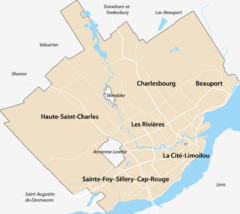Noire River (rivière des Hurons) facts for kids
Quick facts for kids Noire River |
|
|---|---|
| Native name | Rivière Noire |
| Country | Canada |
| Province | Quebec |
| Region | Capitale-Nationale |
| MRC | La Jacques-Cartier Regional County Municipality |
| Municipality | Stoneham-et-Tewkesbury |
| Physical characteristics | |
| Main source | Small forest lake Stoneham-et-Tewkesbury 349 units? 47°05′27″N 71°20′47″W / 47.09083°N 71.34639°W |
| River mouth | Rivière des Hurons Stoneham-et-Tewkesbury 200 m 46°57′13″N 71°23′28″W / 46.95361°N 71.39111°W |
| Length | 8.7 km (5.4 mi) |
| Basin features | |
| Tributaries |
|
The Noire River (which means Black River in English) is a river in Quebec, Canada. It flows into the Huron River. The Noire River runs through the town of Stoneham-et-Tewkesbury, which is just north of Quebec City. This area is part of the Capitale-Nationale region.
The Noire River valley is easy to reach. You can get there using Route 175 and Talbot Boulevard. The river usually freezes over in winter, from early December to late March. It's safest to walk on the ice from late December to early March. The amount of water in the river changes with the seasons. A big increase in water, called a spring flood, usually happens in March or April.
Where the River Starts and Flows
The Noire River begins in a small forest lake. This lake is located in Stoneham-et-Tewkesbury, a town in the Laurentians mountains. The lake is about 4.1 kilometres (2.5 mi) northwest of the village of Saint-Adolphe.
From its start, the Noire River flows for about 8.7 kilometres (5.4 mi). It travels through a deep valley, dropping about 149 metres (489 ft) in height. The river generally flows south, staying between Route 175 and Talbot Boulevard. However, it does cross Talbot Boulevard twice. Finally, it joins the Huron River.
After joining the Huron River, the water continues its journey. It flows for about 15.6 kilometres (9.7 mi) along the Huron River. Then, it crosses Lake Saint-Charles for about 5.0 kilometres (3.1 mi). From there, the water flows into the Saint-Charles River. The Saint-Charles River then empties into the mighty Saint Lawrence River.
Why It's Called the Black River
The name "Rivière Noire" (Black River) was first seen on a map from 1931. The river got its name because of something interesting that happens during heavy rains. When it rains a lot, water rushes down from the tall mountains nearby. This water can make the river look dark or "black."
The official name "Rivière Noire" was confirmed on September 28, 2004, by the Commission de toponymie du Québec.
 | Madam C. J. Walker |
 | Janet Emerson Bashen |
 | Annie Turnbo Malone |
 | Maggie L. Walker |


